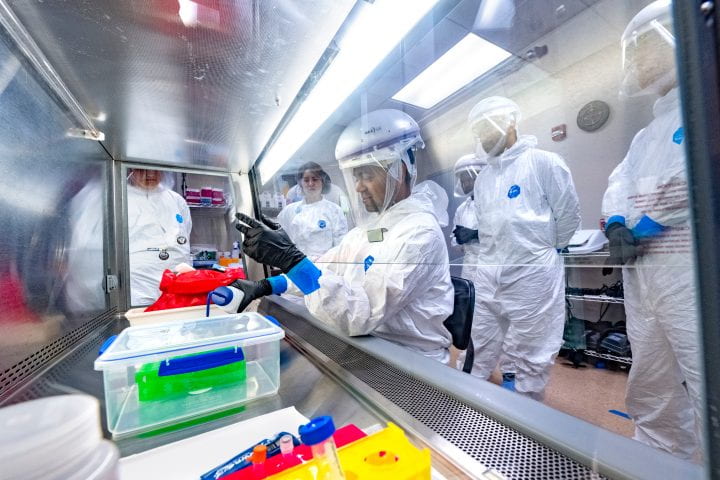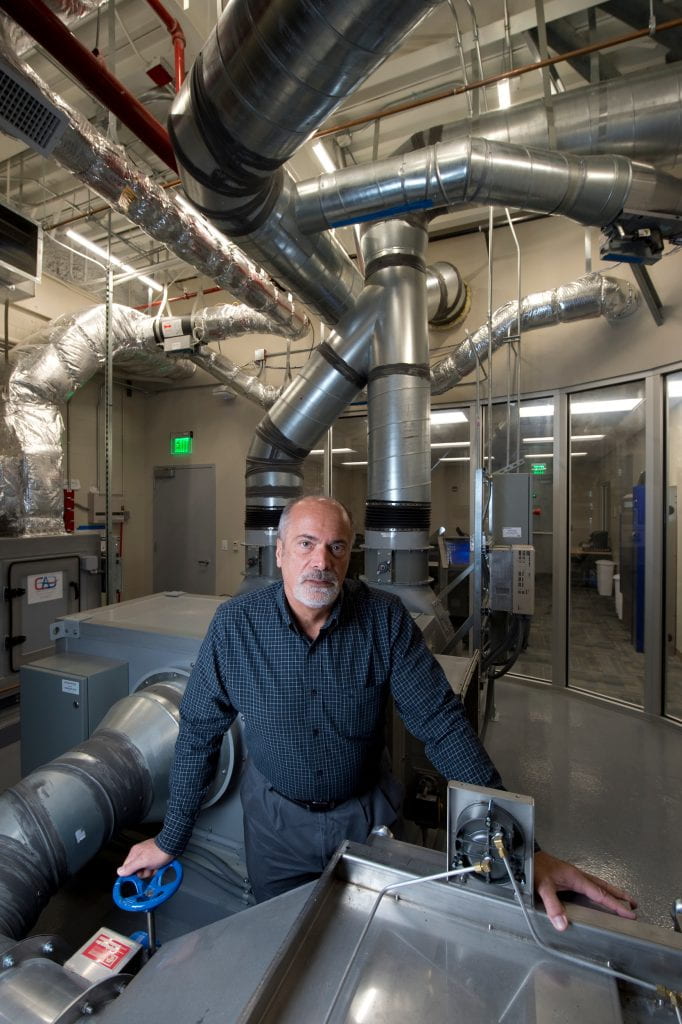Biosecurity blanket
Highly regarded UCI program trains researchers in safe use of specialized labs to study dangerous pathogens

In response to the COVID-19 pandemic, research on coronaviruses and other harmful pathogens has increased in laboratories across the world – and not just any labs. Work of this sort often requires specialized, high-containment facilities known as biosafety level 3 laboratories.
These BSL-3 labs are very sophisticated and are operated under negative pressure to provide safe environments in which to study airborne viruses and bacteria. They house some of the most important biomedical research taking place today.
Most elite research universities have BSL-3 labs (UC has over 30), as do pharmaceutical companies and federal agencies like the National Institutes of Health and the Centers for Disease Control and Prevention. There are an estimated 1,500-plus of these labs in the U.S., and to use or maintain one requires highly technical instruction.
Many who work in and manage these labs turn to the UCI National Biosafety Level 3 Training Program. Gary Landucci started it in 2006, first offering a five-day course teaching scientists how to safely conduct research with high-risk infectious disease pathogens in them.
With support from corporate sponsors, the NIH and the UCI School of Medicine, the program moved in 2015 into a state-of-the-art training facility on campus, where Landucci and his team run hands-on, weeklong instructional programs year-round for researchers, operations and maintenance personnel, biosafety professionals, inspectors and first responders from all over the world. In 2016, the facility was designated as an NIH National Training Center.
Since its inception, the program has educated more than 3,000 individuals, and Landucci says that with demand increasing over the past few years, it currently serves around 300 people annually. Classes are regularly provided at UCI as well as on-site at other UC campuses and additional locations.

“Based on feedback from our clients, it’s recognized as the top BSL-3 program in the country,” Landucci says.
What makes it the best? He points to the training staff of three, who, combined, have more than 45 years of BSL-3 experience. Plus, the program has a fully functional BSL-3 lab and HVAC system within a classroom setting.
“All the equipment is under one roof, and no hazardous materials or pathogens are present,” Landucci says. “It allows us to provide hands-on training in a safe environment.”
When the CDC first turned to an outside organization to teach its BSL-3 laboratory personnel, it called upon Landucci and his team. Over the last year, the UCI instructors have traveled to the CDC’s Atlanta campus (September 2022 and May 2023) and Fort Collins, Colorado, campus (August 2023).
Under former UC President Janet Napolitano, the UCI National BSL-3 Training Program in 2015 was named one of six UC Centers of Excellence, which serve in a systemwide capacity by sharing their expertise and leadership in risk management, healthcare, wellness, and environmental health and safety.
Landucci says that UC provides about half of his center’s operating expenses, which enables it to provide training to all UC campus personnel associated with BSL-3 laboratories at no additional cost to them.
His team also works with UC researchers and administrators to establish best practices and often visits the seven other UC campuses that operate BSL-3 labs to help ensure that their high-containment facilities and practices meet or exceed federal standards.
“UCI’s National BSL-3 Training Program not only underscores the university’s dedication to safe and robust research but also serves as a benchmark for institutions engaging in high-containment laboratory research,” says Kevin Confetti, UC associate vice president for risk services, who oversees the Centers of Excellence program. “The University of California boasts the highest number of high-containment laboratories in the country. Establishing a stringent design and performance standard has become the cornerstone of our biosafety blueprint. Central to UC’s biosecurity protocols is the emphasis on hands-on, immersive simulation training for BSL-3 researchers and other facility personnel. The BSL-3 Training Program is paramount in providing this not only to UC faculty, staff and students but to others across the country.”
Adds Landucci: “UC is a national leader for infectious diseases research and is developing and setting standards with our BSL-3 laboratories. We are establishing the best practices for building and operating these labs along with training standards that are a role model for others to follow.”